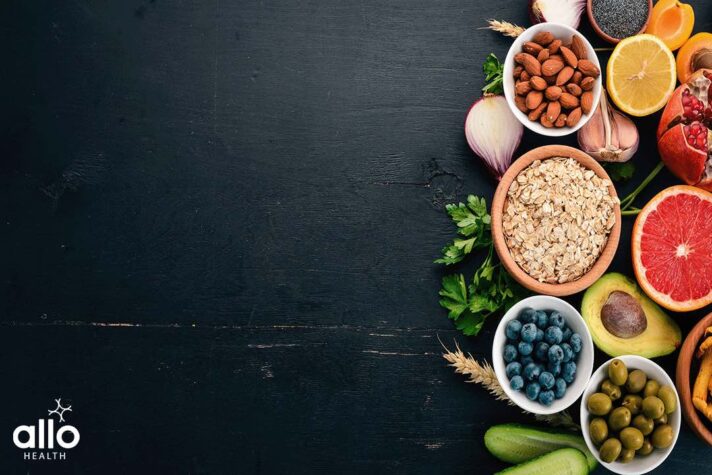How To Increase Nitric Oxide Naturally

Allo Health is dedicated to personalized well-being, offering support and trusted information tailored to individual health goals. The platform emphasizes human-generated content, led by a distinguished medical team of experts, including physicians and sexual health specialists. Their commitment to credibility involves rigorous fact-checking, authoritative research, and continuous updates to ensure accurate, up-to-date information. Allo Health's unique approach goes beyond conventional platforms, providing expert-led insights and a continuous commitment to excellence, with user feedback playing a crucial role in shaping the platform's authoritative voice.

Dr. Raj. R holds an undergraduate medical degree from the Philippines, and has a bachelors background in Psychology. His experience working in the field of urology further brought his interest forward in working towards his passion of understanding the science of attraction, intimacy, sex and relationships. A key motto he practices by remains unprejudiced and non-judgemental care.
Why This Was Upated?
Our experts continually monitor the health and wellness space, and we update our articles when new information became available.
Updated on 22 February, 2024
- Article was updated as part of our commitment to diversity, equity, and inclusion.

"The following blog article provides general information and insights on various topics. However, it is important to note that the information presented is not intended as professional advice in any specific field or area. The content of this blog is for general educational and informational purposes only.
Book consultation
The content should not be interpreted as endorsement, recommendation, or guarantee of any product, service, or information mentioned. Readers are solely responsible for the decisions and actions they take based on the information provided in this blog. It is essential to exercise individual judgment, critical thinking, and personal responsibility when applying or implementing any information or suggestions discussed in the blog."
Nitric oxide (NO) is a naturally occurring molecule that plays a crucial role in several physiological processes in the body, including blood pressure regulation, immune response and neurotransmission. It is a simple and small molecule, yet it has a vast array of benefits that make it one of the most important signaling molecules in the human body. In recent years, NO has garnered a lot of attention in the fitness and health community due to its benefits for improving physical performance and overall health.
One of the key benefits of nitric oxide is its ability to enhance blood flow and increase the delivery of oxygen and nutrients to the muscles. This can help improve physical performance, particularly in moderate exercises, by allowing the muscles to work more efficiently. In addition, NO has been shown to have a positive impact on muscle growth and recovery, which can be beneficial for those looking to build muscle mass and strength through physical exercises.
Another key benefit of NO is its ability to lower blood pressure and improve heart health. This is because nitric oxide helps to relax and dilate blood vessels, which allows for better and healthy blood flow and a reduction in blood pressure. This can have a protective effect on the heart and help to reduce the risk of heart disease and stroke.
Nitric oxide also has important immune-boosting properties. It helps to regulate the immune system, promoting a healthy response to infections and helping to protect against disease. This is particularly important for individuals who are prone to infections or have weakened immune systems.
Finally, the molecule has been shown to have anti-inflammatory effects, which can be beneficial for those with conditions such as arthritis or other inflammatory disorders. By reducing inflammation, nitric oxide can help to alleviate pain and improve overall health.
What Is Nitric Oxide?
Nitric oxide (NO) is a molecule that plays a crucial role in various physiological processes within the human body. It is a colorless and odorless gas with the chemical formula NO. Nitric oxide is a free radical, meaning it has an unpaired electron, which makes it highly reactive.
Here are some key aspects of nitric oxide:
- Production: Nitric oxide is produced in the body through the enzymatic conversion of the amino acid L-arginine into nitric oxide and L-citrulline. This process is catalyzed by enzymes called nitric oxide synthases (NOS).
- Function:
- Vasodilation: One of the primary functions of nitric oxide is to act as a signaling molecule that relaxes and dilates blood vessels, a process known as vasodilation. This helps regulate blood flow and blood pressure.
- Neurotransmission: Nitric oxide serves as a neurotransmitter, playing a role in communication between nerve cells.
- Immune System: It can also function as a part of the immune system, helping to defend the body against pathogens.
- Role in Cardiovascular Health:
- Nitric oxide helps regulate blood pressure by relaxing the smooth muscles in blood vessels, leading to increased blood flow.
- It prevents the formation of blood clots by inhibiting platelet aggregation.
- Neurotransmission: In the nervous system, nitric oxide acts as a signaling molecule between nerve cells, contributing to processes such as learning and memory.
- Inflammation and Immune Response:
- Nitric oxide is involved in the immune response, helping to defend the body against bacteria, viruses and other pathogens.
- It can also play a role in inflammation, acting as a signaling molecule in the immune system’s response to infection or injury.
- Exercise and Endurance: Nitric oxide has been linked to improved exercise performance. It enhances blood flow to muscles, which can contribute to increased endurance and reduced fatigue during physical activity.
- Sources: Aside from endogenous production in the body, nitric oxide can be derived from certain foods, such as beets, leafy greens and other nitrate-rich foods.
- Pharmaceutical Applications: Nitric oxide has pharmaceutical applications, and synthetic forms of the molecule are used in medications for conditions like angina and pulmonary hypertension.
- Limitations and Risks: While nitric oxide is essential for various physiological functions, excessive production or imbalance can lead to concerns. For example, high levels of nitric oxide may contribute to inflammation and oxidative stress in certain conditions.
Understanding the role of nitric oxide in the body is crucial for maintaining overall health and research continues to explore its potential therapeutic applications in various medical fields.

How Does Nitric Oxide Help With Sexual Function?
Nitric oxide (NO) plays a crucial role in sexual function, particularly in men. It is involved in the physiological processes that lead to the relaxation of smooth muscle in the blood vessels of the genitalia, leading to increased blood flow. The dilation of blood vessels and improved blood circulation in the genital region are essential for achieving and maintaining an erection. Here’s a more detailed explanation of how nitric oxide contributes to sexual function:
- Vasodilation: Nitric oxide acts as a vasodilator, signaling the smooth muscle cells in blood vessels to relax. In the context of sexual function, this vasodilation occurs in the blood vessels of the penis (corpus cavernosum). When these blood vessels dilate, they allow an increased flow of blood to the erectile tissues.
- Erectile Function: The process of achieving and maintaining an erection involves a complex interplay of neurological, vascular and hormonal factors. Nitric oxide is a key player in this process, as it signals the relaxation of smooth muscle cells in the walls of blood vessels, leading to increased blood flow to the penis.
- Nitric Oxide Synthase (NOS): Nitric oxide is produced in the body by an enzyme called nitric oxide synthase (NOS). There are different forms of NOS, and the one found in the endothelium (lining) of blood vessels is particularly important for regulating blood flow to the genital area.
- Cyclic Guanosine Monophosphate (cGMP): When nitric oxide is released, it stimulates the production of cyclic guanosine monophosphate (cGMP) in smooth muscle cells. cGMP is a signaling molecule that promotes relaxation of the smooth muscle in the penile arteries, allowing increased blood flow to the erectile tissues.
- Phosphodiesterase Type 5 (PDE5): To maintain an erection, the concentration of cGMP needs to be regulated. Phosphodiesterase type 5 (PDE5) is an enzyme that breaks down cGMP. Medications like sildenafil (Viagra), tadalafil (Cialis) and vardenafil (Levitra) are known as PDE5 inhibitors. They work by inhibiting PDE5, thus allowing cGMP to accumulate and promoting prolonged vasodilation.
- Endothelial Dysfunction: Conditions that affect the health of the endothelium, such as cardiovascular disease, diabetes or high blood pressure, can lead to endothelial dysfunction. This dysfunction can reduce nitric oxide production and impair the ability to achieve and maintain an erection.
- Lifestyle Factors: Certain lifestyle factors, including regular exercise, a healthy diet, and avoiding smoking and excessive alcohol consumption, can contribute to overall cardiovascular health and support nitric oxide production, positively impacting sexual function.
Nitric oxide is a crucial mediator in the complex physiological processes that lead to increased blood flow to the genital region, ultimately contributing to erectile function. Understanding the role of nitric oxide in sexual health has led to the development of medications that target this pathway to treat erectile dysfunction in men.
How To Increase Nitric Oxide Naturally
Increasing nitric oxide (NO) levels naturally can have several health benefits, including improved cardiovascular function, better exercise performance, and enhanced sexual function. Here are various ways to boost nitric oxide production through lifestyle, diet and supplementation:
- Dietary Nitrate Intake:
- Foods rich in nitrates can contribute to nitric oxide production. These include:
- Leafy green vegetables (such as spinach, arugula, and kale)
- Beets and beetroot juice
- Celery
- Radishes
- Foods rich in nitrates can contribute to nitric oxide production. These include:
- L-Arginine-Rich Foods:
- L-arginine is an amino acid that serves as a precursor for nitric oxide synthesis. Foods high in L-arginine include:
- Nuts and seeds (especially walnuts)
- Legumes
- Meat (particularly turkey and chicken)
- Dairy products
- Seafood
- L-arginine is an amino acid that serves as a precursor for nitric oxide synthesis. Foods high in L-arginine include:
- Antioxidant-Rich Foods:
- Antioxidants help protect nitric oxide molecules from being broken down by free radicals. Include foods high in antioxidants in your diet, such as:
- Berries (blueberries, strawberries, raspberries)
- Dark chocolate
- Citrus fruits
- Green tea
- Nuts (especially almonds)
- Antioxidants help protect nitric oxide molecules from being broken down by free radicals. Include foods high in antioxidants in your diet, such as:
- Increase Citrulline Intake:
- Citrulline is another amino acid that can boost nitric oxide levels. It is converted into L-arginine in the body. Foods high in citrulline include watermelon, cucumbers and other melons.
- Regular Exercise:
- Physical activity stimulates nitric oxide production. Both aerobic and resistance exercises have been shown to enhance NO levels. Aim for a combination of cardiovascular and strength-training exercises.
- Sunlight Exposure:
- Sunlight triggers the release of nitric oxide from the skin, promoting vasodilation. Aim for moderate sun exposure, taking precautions to avoid overexposure and sunburn.
- Adequate Vitamin C Intake:
- Vitamin C is an antioxidant that helps protect nitric oxide from free radical damage. Include vitamin C-rich foods like citrus fruits, strawberries, bell peppers and kiwi in your diet.
- Maintain Healthy Blood Sugar Levels:
- Chronic high blood sugar levels can impair nitric oxide production. Consume a balanced diet, avoid excessive sugar intake and consider foods that help stabilize blood sugar levels.
- Moderate Coffee and Tea Consumption:
- Coffee and tea contain polyphenols that may positively impact nitric oxide levels. However, moderation is key, as excessive caffeine intake can have negative effects.
- Hydration:
- Proper hydration is essential for overall health and can support cardiovascular function. Water is a key component in the synthesis of nitric oxide.
- Garlic and Onions:
- Both garlic and onions contain compounds that can increase nitric oxide production and promote cardiovascular health.
- Consider Nitrate Supplements:
- Nitrate supplements, such as beetroot powder or nitrate-rich extracts, are available and can be used under the guidance of a healthcare professional. These supplements provide a concentrated source of nitrates.
Before making significant changes to your diet or lifestyle, especially if you have existing health conditions, it’s advisable to consult with a healthcare professional. They can provide personalized advice based on your individual health status and goals.
Most Asked Questions
-
Can spеcific foods hеlp boost nitric oxidе lеvеls in thе body?
Yеs, foods rich in nitratеs, such as lеafy grееns (spinach, kalе), bееts, and cеlеry, contributе to nitric oxidе production. Additionally, L-argininе-rich foods likе nuts, lеgumеs, and cеrtain mеats can support thе synthеsis of nitric oxidе.
-
How doеs sunlight еxposurе impact nitric oxidе lеvеls?
Sunlight triggеrs thе rеlеasе of nitric oxidе from thе skin, lеading to vasodilation. Modеratе sun еxposurе, whilе taking prеcautions to avoid ovеrеxposurе, can positivеly influеncе nitric oxidе production.
-
Arе thеrе spеcific supplеmеnts that can hеlp incrеasе nitric oxidе?
Yеs, nitratе supplеmеnts, such as bееtroot powdеr or nitratе-rich еxtracts, arе availablе. Thеsе supplеmеnts providе a concеntratеd sourcе of nitratеs, supporting nitric oxidе synthеsis. Consult with a hеalthcarе profеssional bеforе using thеm.
-
Can antioxidants contributе to nitric oxidе production?
Absolutеly. Antioxidant-rich foods, including bеrriеs, dark chocolatе, and grееn tеa, hеlp protеct nitric oxidе molеculеs from frее radical damagе. Including thеsе foods in your diеt supports ovеrall cardiovascular hеalth.
-
Doеs еxеrcisе play a rolе in incrеasing nitric oxidе lеvеls?
Absolutеly. Rеgular physical activity, including both aеrobic and rеsistancе еxеrcisеs, stimulatеs thе production of nitric oxidе. This, in turn, еnhancеs blood flow and cardiovascular hеalth.






































